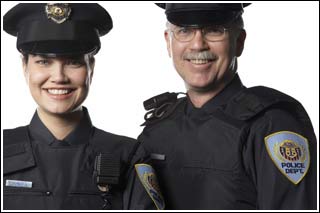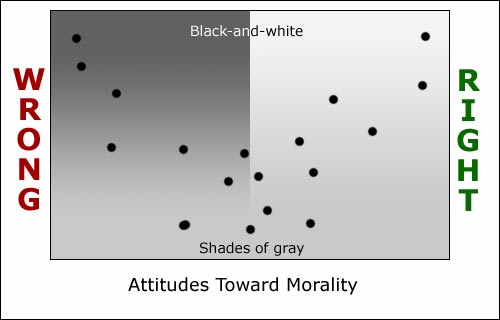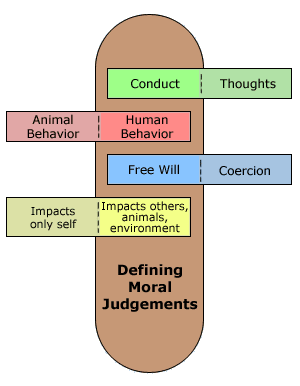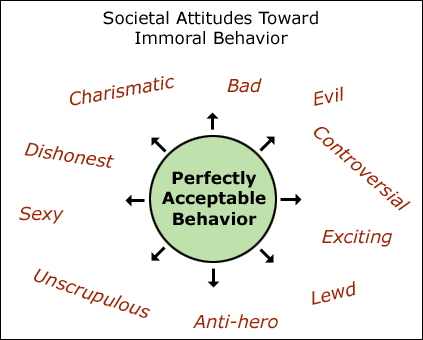
CRIMJ465:
Lesson 2: Morality, Ethics, and Human Behavior
Introduction
The study of ethics is vital in today's society and frames the examination of criminal justice ethics within the milieu of the larger sphere of ethics. The function of criminal justice specialists as public servants will be highlighted in this lesson. Definitions of a number of fundamental terms in the study of ethics will be offered as well as differentiation between ethics and morality and ethical issues and ethical dilemmas. This lesson will also describe the similarities and vibrant connection between crime and unethical conduct, while pointing out that simply developing codes of ethics does not assure ethical behavior.
Objectives
After completing this lesson, students should be able to:
- Explain the difference between ethical issues and ethical dilemmas;
- Recognize the difference between morality and ethics;
- Identify the components of moral judgment;
- Compare the ethical responsibilities of citizens and criminal justice professionals.

Please complete readings and assignments as listed on the course schedule.
Why Study Ethics?
Human behavior tends to be guided by each individual's perception of right and wrong. These behavioral choices or judgments are of particular importance to criminal justice practitioners due to the unique position they hold in society. They are empowered with great discretion in the hope they will exercise that power with restraint. They are given the task of enforcing the legal code and a position of public trust as public servants.
The study of ethics allows us to understand the manner in which ethical decisions are made. For criminal justice practitioners, the study of ethics promotes them to exercise their discretion in a morally responsible way while making their obligation to the public their primary concern. For criminal justice students, the study of ethics provides a framework to manage future ethical dilemmas in a deliberate and reflective way.

Defining Ethics and Morality
Often, the terms ethics and morality are used as though they have the same meaning. This is not the case. Ethics may be described as the examination of how particular acts are agreed upon as good or bad. Morality (morals) is used to describe as principles of right or wrong. While morality outlines good conduct, offering rules for proper action, ethics is the study of morality, the study of what constitutes good conduct (Albanese, 2016).
In the field of ethics, there are several branches: metaethics, normative ethics, applied ethics, and professional ethics. Metaethics refers to the philosophical quest of the exact definitions of specific ethical terms. Normative ethics refers to the study of our moral duties. Applied ethics reviews the manner in which normative ethics are applied in every day life. Professional ethics is a subset of applied ethics in that its focus is on that which is classed as good within a certain profession.
Moral judgments have been found to have a number of common elements. For example, moral judgments must focus on tangible behavior and not simply concepts. These behaviors must be those of humans and not animals, actions performed as the result of free will and only in relation to those actions that affect others, animals, or our environment.
Is it possible for persons to engage in behavior about which moral judgment could be made, but the individual performing the behavior not judged as immoral? Yes! There have been and will continue to be occasions when persons will engage in behavior judged immoral and not be judged as such. For example, in August 2003, a pizza delivery person named Brian Douglas Wells was forced to commit a bank robbery because some unknown person had locked a bomb to his neck and threatened to detonate it if he did not cooperate with the robbery. After robbing the bank, the police stopped him and before they could remove the device, it was detonated killing the pizza delivery person. Clearly, this person was under duress, thus without free will. Would you judge his actions (i.e., bank robbery) as immoral? Would you judge *him* as immoral based on this incident?
Our legal system also protects persons declared as mentally incompetent as not responsible for immoral behavior. Moral judgments contain a number of common properties.
- First, they are primarily focused on conduct and not simply thoughts;
- Second, only human behavior can be considered. The actions of animals do not qualify;
- Third, only actions carried out as a consequence of free will may be considered. Any action carried out because the person was under duress does not qualify nor any action committed by a person incapable of rational thought;
- Finally, moral judgments are possible only for actions that impact other persons, animals, or the environment.
Duties and values are also studied in ethics. A duty may be defined as any action that would characterize a moral person. For example, persons employed in criminal justice are often said to be held to a higher standard of duty than the rest of the citizenry. Prioritizing values assists in the ethical decision-making process.

Reference:
Albanese, J. S. (2016). Professional ethics in criminal justice: Being ethical when no one is looking (4th ed.). Boston: Pearson.
Morality and the Law
Morality and law coexist in what has been characterized as a complex and dynamic environment. Although the two are related, they are separate entities. On the one hand, laws are rules and regulations codified by society. On the other hand, morality is not so clearly classified. At times, law and morality appear to overlap. For example, law and morality appear to be in harmony in instances such as laws enacted against murder. At other times, they appear to be out of sync as in failure of adult children to aid and assist an impoverished parent.
At times the differences between law and morality may be viewed in the difference between criminal and moral culpability. The U.S. criminal justice system has a long tradition of viewing juveniles and some persons with mental illness as not responsible or culpable for their actions and/or moral decisions. The legal system also provides a dispensation from moral culpability in certain situations in which persons are forced to commit what would otherwise be considered immoral and/or illegal behavior such as a person killing another in self-defense. There also exist various mechanisms of social control ranging from rules and regulations at the low end of the continuum to codified criminal law, which provides the highest level of sanction.

Morality and Behavior
It would be naïve to believe that simply because rules and regulations have been established regarding moral behavior that all members of society would automatically adhere to them. There is an ever-increasing list of criminological theories that attempt to explain deviant behavior, and psychologists have also attempted to provide theoretical explanations for why people lie and cheat. At the same time, our society seems to admire immoral and/or illegal behavior as it becomes painfully obvious that lies and deception have become common tools of politicians and the criminal justice system. Yet, there is a tendency to make heroes out of people who lie and engage in criminal behavior. One need not look far to find examples of this misplaced hero worship.

Analyzing Ethical Dilemmas
In order to formulate reliable moral decisions, a wide-ranging methodology to grasp the milieu in which moral choices are made must exist. Ethical issues and ethical dilemmas are not the same. On the one hand, ethical issues often arise as topics in discussion that many times result in the formulation of policy. On the other hand, ethical dilemmas are often portrayed as specific scenarios for which persons are obliged to select a certain course of action following some inner grappling with the issue. The road to making proper choices when facing an ethical dilemma has certain decision-making steps:
- Identify the facts.
- Identify relevant values and concepts.
- Identify all possible moral dilemmas for each party involved.
- Decide what is the most immediate moral or ethical issue facing the individual.
- Resolve the ethical or moral dilemma by using an ethical system or some other means of decision making.